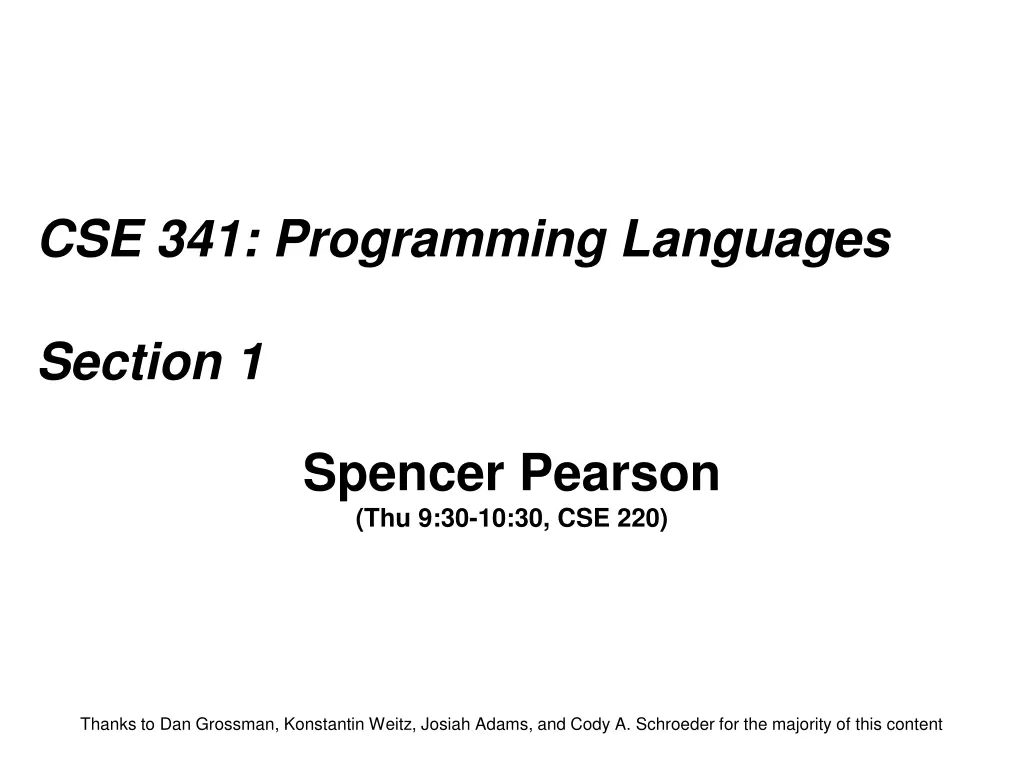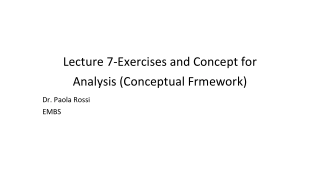
Programming Languages Section: ML Development Workflow and Debugging
Explore ML development workflow topics like the REPL, Emacs usage, variable shadowing, and debugging errors in this programming languages section. Understand the importance of syntax, type-checking, and evaluation in preventing and fixing coding mistakes.
Download Presentation

Please find below an Image/Link to download the presentation.
The content on the website is provided AS IS for your information and personal use only. It may not be sold, licensed, or shared on other websites without obtaining consent from the author. If you encounter any issues during the download, it is possible that the publisher has removed the file from their server.
You are allowed to download the files provided on this website for personal or commercial use, subject to the condition that they are used lawfully. All files are the property of their respective owners.
The content on the website is provided AS IS for your information and personal use only. It may not be sold, licensed, or shared on other websites without obtaining consent from the author.
E N D
Presentation Transcript
CSE 341: Programming Languages Section 1 Spencer Pearson (Thu 9:30-10:30, CSE 220) Thanks to Dan Grossman, Konstantin Weitz, Josiah Adams, and Cody A. Schroeder for the majority of this content
Todays Agenda ML Development Workflow The REPL (Read Eval Print Loop) Emacs Using use More ML Shadowing Variables Debugging Comparison Operations Boolean Operations Testing 2
The REPL Read-Eval-Print-Loop is well named Useful for quickly trying things out (but save code for reuse by putting it in a .sml file) Expects semicolons (P.S.: rlwrap might be useful.) 3
Emacs Demo Recommended (not required) editor for this course Powerful, but the learning curve can at first be intimidating 4
Using use use "foo.sml"; Enters bindings from the file foo.sml Like typing the variable bindings one at a time in sequential order into the REPL (more on this in a moment) Result is () bound to variable it Ignorable It s dangerous to reuse use without restarting the REPL session! Definitions linger. 5
Debugging Errors Your mistake could be: Syntax: What you wrote means nothing or not the construct you intended Type-checking: What you wrote does not type-check Evaluation: It runs but produces wrong answer, or an exception, or an infinite loop Work on developing resilience to mistakes: Slow down Don t panic Read what you wrote very carefully Preventative medicine: testing! 6
Shadowing of Variable Bindings val a = 1; (* a -> 1 *) val b = a; (* a -> 1, b -> 1 *) val a = 2; (* a -> 2, b -> 1 *) 1. Expressions in variable bindings are evaluated eagerly Before the variable binding finishes Afterwards, the expression producing the value is irrelevant 1. Multiple variable bindings to the same variable name, or shadowing , is allowed but discouraged When looking up a variable, ML uses the latest binding by that name in the current environment 1. Remember, there is no way to assign to a variable in ML Can only shadow it in a later environment After binding, a variable s value is an immutable constant 7
Try to Avoid Shadowing val x = "Hello World"; val x = 2; val res = x * 2; (* is this a type error? *) (* is this 4 or a type error? *) Shadowing can be confusing and is often poor style Why? Reintroducing variable bindings in the same REPL session may.. make it seem like wrong code is correct; or make it seem like correct code is wrong. 8
Using a Shadowed Variable Is it ever possible to use a shadowed variable? Yes! And no It can be possible to uncover a shadowed variable when the latest binding goes out of scope val threshold = 10; (* threshold -> 10 *) fun is_big(x : int) = x > threshold; (* threshold -> 10, is_big -> (function) *) val threshold = 20; (* threshold -> 20, is_big -> (function) *) val z = is_big 15; 9
Use use Wisely Warning: Variable shadowing makes it dangerous to call use more than once without restarting the REPL session. It may be fine to repeatedly call use in the same REPL session, but unless you know what you re doing, be safe! Ex: loading multiple distinct files (with independent variable bindings) at the beginning of a session use s behavior is well-defined, but even expert programmers can get confused Restart your REPL session before repeated calls to use 10
Comparisons For comparing int values: = <> > < >= <= You might see weird error messages because comparators can be used with some other types too: > < >= <= can be used with real, but not 1 int and 1 real = <> can be used with any equality type but not with real Let s not discuss equality types yet 11
Boolean Operations Operation Syntax Type-checking Evaluation e1 and e2 must have type bool e1 and e2 must have type bool e1 must have type bool andalso e1 andalso e2 Same as Java s e1 && e2 Same as Java s e1 || e2 Same as Java s !e1 orelse e1 orelse e2 not not e1 not is just a pre-defined function, but andalso and orelse must be built-in operations since they cannot be implemented as a function in ML. Why? andalso and orelse short-circuit their evaluation and may not evaluate both e1 and e2. Be careful to always use andalso instead of and. and is different. We will get back to it later. 12
Testing Write tests for your code! val test1 = (abs 2 = 2); val test2 = (abs 0 = 0);






















